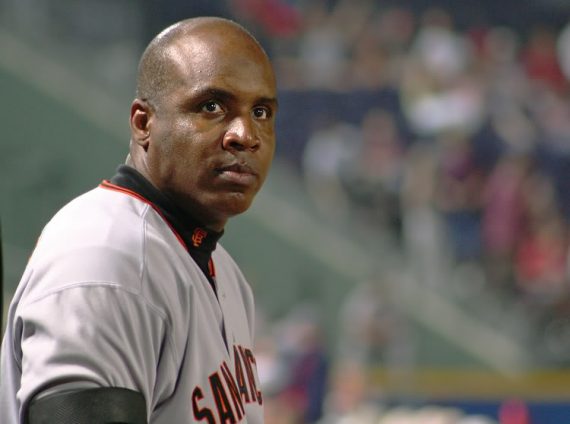Barry Bonds Perjury Trial: Why?
The federal government has spent seven years and some six million dollars pursuing Barry Bonds. Why?
George Dohrmann asks: Is Barry Bonds a victim?
The home run king is not a likable fellow. And he almost certainly lied to a federal grand jury in 2003 when he denied knowingly taking performance enhancing drugs.
So, if Bonds is most likely guilty, how might the jury see him as a victim? Start with the ambiguity of the questions asked by assistant U.S. attorney Jeffrey Nedrow during Bonds’s grand jury testimony; a few follow-up questions by Nedrow would have clarified Bonds’s statements. The defense team will also highlight that this is potentially a career case for Nedrow, fellow prosecutor Matthew Parrella and investigator Jeff Novitzky. They will be portrayed as being fixated on exposing and embarrassing the slugger. “One argument that will likely be made is that from the beginning the BALCO investigation was always about Bonds,” says former federal prosecutor Richard Cutler.
Then there is the length of the case, which was kept alive even as the evidence against Bonds was weakened by Anderson’s refusal to testify and evidentiary rulings by Judge Susan Illston that favored the defense. Furthermore Bonds’s alleged lying may be perceived as not worthy of the effort. “There probably wasn’t a case I worked on where someone I put before the grand jury wasn’t entirely truthful,” says Cutler. “But [we] decided our resources were better spent elsewhere.” The defense, Cutler says, may have some success portraying the prosecution of Bonds as an example of government run amok.
This argument shouldn’t be dismissed as merely clever lawyering. There is an underpinning of truth to the premise that the government has ill-served the people with its Ahab-like pursuit of Bonds. Federal prosecutors not working the Bonds case privately complain about the resources dedicated to his prosecution. Because of budget cuts, they are working shorthanded on drug and immigration cases, issues they would argue are far more important than nailing one guy for lying to a grand jury. And even if Bonds is convicted, he is unlikely to spend significant time in jail. The longest sentence given so far to BALCO perjurers was a year of home confinement.
This case has, from the beginning, struck me as a waste of government resources. Yes, the drugs in question are illegal, at least outside very limited circumstances when prescribed by a physician. And it’s not a victimless crime; when taking dangerous substances leads to fame and fortune, it provides strong incentives for kids to follow the example of their idols. Nor do we want to turn a blind eye to perjury. If lying under oath is seen as acceptable, our whole justice system is undermined.
But our resources are limited. The federal government has spent seven years and some six million dollars pursuing Barry Bonds. Surely, there are more worthwhile uses of our criminal justice system?






I agree with you James. I do think that performance
enhancing drug use is not right. It does level the
Playing Field for others. Lying about it to a Grand Jury
is also wrong. But spending all this money and time
to prosecute is a bigger wrong in my opinion.
To me this is kind of sort of a victimless crime.
The only one that may be hurt over this is the
player who may have to pay the consequence of
the drug use later in life. I believe the sports leagues
should be required to test players on a regular basis
and then establish and enforce rules and punishment
that would be acceptable to all.
Many Prosecutors today I believe, only want to further their
own political goals at any cost. Look at what is going on
in Colorado today.
Isn’t this, though, a binary proposition? Prosecute or not? Perhaps the US needs some other legal system that allows for ‘fuzzy’ areas to be dealt with by lesser tribunals, but that’s not the system we have.
As you’ve pointed out, to not prosecute sends all sorts of wrong messages. But to prosecute necessarily means that lots of money is involved.
Perhaps we should be heaping blame for the expensive court procedures on Bond. He could have copped a plea, after all. Or, he could have just not taken steroids. Or he could have not lied about taking steroids.
Maybe there’s a way, assuming he’s found guilty, to hit him up with a fine that would cover the costs of prosecution…
The Bonds case is at least a close one since the perjury charge appears to be related mostly to Grand Jury questioning that could have been cleared up by additional questioning. The same can’t be said for Roger Clemens – that idiot demanded the right to testify before Congress to “clear his name” and then proceeded to lie.
I am puzzled by this post. You ask a question in such a way as to imply that there is no good answer, but then you provide an excellent answer – “. If lying under oath is seen as acceptable, our whole justice system is undermined.”
Maybe if the person in question were Barry Shmoe, someone none of us have ever heard of, you might have a point. The justice system would not be critically undermined if the gov’t gives Schmoe a free pass on perjury, because no one would ever know about it. If you let a meta-celebrity blatantly perjure himself publicly and suffer no consequences, then you will damage the justice system.
Lying to a grand jury really just can’t be acceptable. I’m not sure why anyone would find this to be a hard decision.
There should be a whole lot more perjury charges being prosecuted in this country, and if we have to start here, so be it.